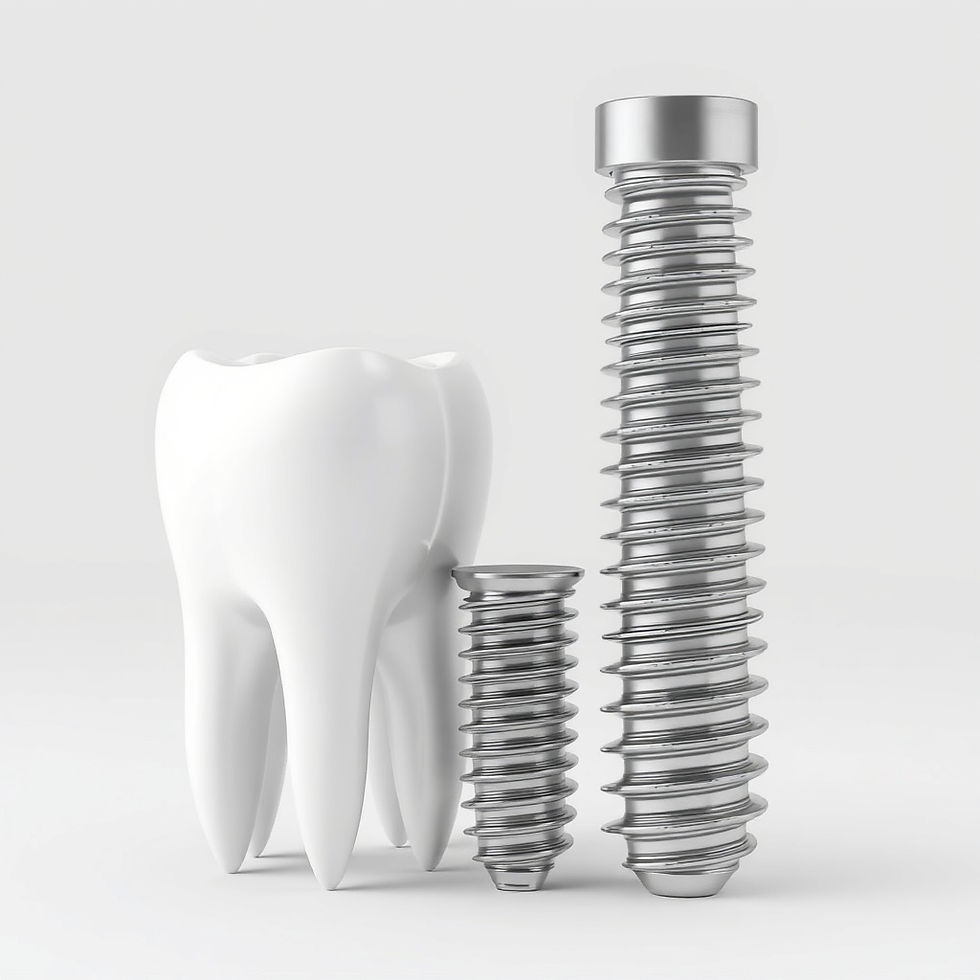Cuspid Teeth: Importance in Dental Health
- plurefy com
- Aug 18, 2025
- 4 min read
Updated: Aug 25, 2025

When it comes to dental health, many people tend to focus mainly on the appearance and condition of their front teeth or molars. However, the cuspid teeth, also known as canine teeth, play a vital role in maintaining a healthy and functional mouth. In this comprehensive guide, we'll explore why these teeth are essential, how they contribute to your oral health, and effective strategies for their care.
What Are Cuspid Teeth?
Cuspid teeth, also known as canine teeth, are the pointed teeth situated between the incisors and premolars. Noted for their similarity to a dog's fangs, these teeth play important roles in the human mouth. Humans have a total of four cuspid teeth, with two on the top and two on the bottom.
Unique Features of Cuspid Teeth
Cuspid teeth stand out in several unique ways, each playing a vital role in oral health:
Shape: Cuspid teeth have a pointed, sharp edge specifically designed for gripping and tearing food. This unique shape not only aids in consuming various food textures but also helps in the initial stage of digestion by breaking down food into manageable pieces.
Location: Strategically positioned at the corners of the dental arches, cuspid teeth act as a transition between the incisors and premolars. This placement is essential for evenly distributing the forces of biting and chewing across the dental arch, preventing undue stress on any single tooth.
Strength: As some of the longest and strongest teeth, cuspid teeth are deeply anchored into the jawbone. This strong anchorage provides stability and support, allowing them to withstand significant pressure during daily activities like biting and chewing.

Functions of Cuspid Teeth

Cuspid teeth serve several important functions that significantly contribute to overall dental health and functionality:
Biting and Chewing
Cuspid teeth are uniquely crafted to effectively grip and tear food. Their sharpness plays a key role in slicing food into smaller, more manageable pieces, which makes chewing and digestion easier. This function is crucial not only for a balanced diet but also for ensuring the body receives proper nutrition by aiding in the efficient breakdown of food.
Alignment and Structure
Cuspid teeth are vital for maintaining the alignment and structure of your other teeth. They guide the teeth into proper occlusion (bite), ensuring that the upper and lower jaws align correctly when the mouth is closed. This alignment is essential for preventing bite-related issues such as overbite, underbite, and crossbite, which can lead to complications if not addressed.
Aesthetic Appeal
While functionality is crucial, cuspid teeth also play a significant role in the aesthetic appeal of your smile. Their position and unique shape add character and definition to your smile, enhancing facial symmetry and balance. A well-aligned set of cuspid teeth can noticeably improve the overall appearance of your smile, boosting confidence and self-esteem.
Importance of Dental Hygiene for Cuspid Teeth

Maintaining good dental hygiene is essential for all teeth, including your cuspids. Here's why taking care of these teeth is important:
Preventing Dental Problems
Proper dental hygiene is crucial in preventing common issues like cavities, gum disease, and tooth decay. Due to their pointed shape, cuspid teeth can trap food particles and plaque, making them particularly prone to cavities if not cleaned thoroughly. Regular and meticulous oral care can significantly reduce the risk of these common dental problems.
Enhancing Oral Health
Good oral hygiene practices ensure that cuspid teeth remain strong and healthy, supporting the overall health of your mouth. Regular brushing and flossing help keep plaque and bacteria at bay, reducing the risk of dental problems. Moreover, well-maintained cuspid teeth contribute to the overall structural integrity of your dental arch.
Avoiding Tooth Sensitivity
Neglecting dental hygiene can lead to gum recession, which may expose the root of the cuspid teeth and cause sensitivity. This uncomfortable condition can make eating and drinking painful, affecting your quality of life. Regular dental care, including professional cleanings and check-ups, can help prevent gum recession and tooth sensitivity.

by Roman Marchenko (https://unsplash.com/@romarch)
Tips for Maintaining Healthy Cuspid Teeth
To maintain the health and strength of your cuspid teeth, consider these expert recommendations:
Regular Brushing
Brush your teeth at least twice daily with fluoride toothpaste. Pay particular attention to your cuspids, ensuring all surfaces are thoroughly cleaned. Fluoride toothpaste strengthens tooth enamel, enhancing its resistance to decay and cavities.
Floss Daily
Flossing is essential for removing food particles and plaque between your teeth, including around your cuspids. Make it a daily practice to avoid buildup and keep your gums healthy. Flossing also reaches areas that brushing might miss, ensuring complete oral hygiene.
Use Mouthwash
Add an antiseptic mouthwash to your oral care routine to eliminate bacteria and freshen your breath. This additional step can help reach areas that brushing and flossing may overlook, offering extra protection against plaque and bacteria.
Regular Dental Check-ups
Schedule regular dental visits for check-ups and cleanings. Professional cleanings can remove plaque and tartar that home care might not catch, and your dentist can monitor the health of your cuspid teeth. Early detection of potential issues can prevent more serious problems from arising.
Common Issues with Cuspid Teeth

Although cuspid teeth are strong and durable, they can encounter certain issues:
Impacted Cuspid Teeth
Sometimes, cuspid teeth may not emerge correctly due to insufficient space or misalignment. Impacted cuspids can cause discomfort and may require orthodontic treatment for correction. Early intervention can prevent complications like misalignment of neighboring teeth or cyst formation.
Wear and Tear
Over time, cuspid teeth may wear down due to their frequent use in biting and chewing. This wear can alter their shape and function, potentially leading to dental problems. Regular dental check-ups can help monitor wear patterns and recommend treatments such as dental bonding or crowns to restore their function and appearance.
Cavities and Decay
Like other teeth, cuspids are susceptible to cavities and decay if not properly maintained. Consistent dental hygiene and professional care can help prevent these issues. Fluoride treatments and dental sealants can offer additional protection against decay for cuspid teeth.
Conclusion
Cuspid teeth might not always get the attention they deserve, but they are crucial for maintaining a healthy, functional, and attractive smile. By recognizing their importance and practicing good dental hygiene, you can keep your cuspid teeth strong and healthy for years to come. Regular dental visits and proper care are essential for maintaining the health and function of these important teeth.
Appreciate your cuspid teeth as key players in your oral health team, and continue to smile with confidence!










Comments